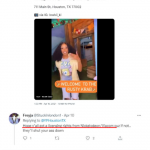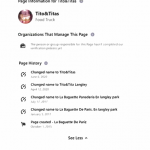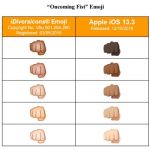
Too Rusty For Krusty–Nickelodeon v. Rusty Krab Restaurant (Guest Blog Post)
by guest blogger Prof. Alexandra Jane Roberts Remember the Fifth Circuit case from 2018 holding that a real restaurant’s name could infringe trademark rights in the name of a fictional restaurant from the TV show SpongeBob SquarePants, the Krusty Krab?…

Court Dismisses Trademark Claims Over Internal Search Results–Las Vegas Skydiving v. Groupon
Las Vegas Skydiving Adventures offers tandem skydiving under the “Fyrosity” brand. It has never offered its services through Groupon. A search for “skydive Fyrosity” at Groupon says “No matching deals. You may also like ….” and produces search results for…

Departing Employees Rename Their Former Employers’ Facebook Account. That May Be a Problem–La Baguette v. Tito & Tita
This is an employer/ex-employee dispute over a Facebook page. As alleged in the complaint, plaintiffs operated a bakery known as “La Baguette,” and hired defendants to manage aspects of the business. Defendants also managed the social media presence of the…

26 Trademark Academics Oppose the SHOP SAFE Act
[Today, Betsy Rosenblatt, Rebecca Tushnet and I sent the following letter to Congress on behalf of 26 trademark academics (here’s a PDF version). This complements a separate letter sent by 38 organizations and companies also opposing the SHOP SAFE Act….
Trademark Registration of Political Messages for Expressive Merchandise–In re Elster (Guest Blog Post)
By guest blogger Lisa Ramsey, Professor of Law, University of San Diego School of Law Federal Circuit holds refusal to register a political message for T-shirts violates the First Amendment, but fails to acknowledge that these types of registrations can…

Airline Sues to Stop Popular Web-Scraping Service–American Airlines v. The Points Guy (Guest Blog Post)
by guest blogger Kieran McCarthy Those interested in web scraping legal issues had high hopes that the Supreme Court’s opinion in Van Buren v. United States last summer would provide clear guidelines on which types of online data access were…

Apple Defeats Copyright Lawsuit Over Emoji Depictions–Cub Club v. Apple
The court summarizes the case: Cub Club Investment created an app that allowed people to send racially diverse emoji. According to the complaint, when Apple learned of the app, it liked the idea—so much so, in fact, that it copied…

Georgia Supreme Court Blesses Google’s Keyword Ad Sales–Edible IP v. Google
Edible Arrangements objected to Google selling its trademark to trigger keyword ads. They filed a trademark lawsuit in 2018 but abandoned the suit when it got sent to arbitration. However, they didn’t give up! The Edible team had the brilliant…

Another Confused Entry in the Social Media Account Ownership Jurisprudence–JLM v. Gutman
This is a lawsuit between a wedding gown company, JLM, and Hayley Paige Gutman, a designer/influencer who worked for JLM. For background, check out my post on the district court’s ruling here: “Social Media Ownership Disputes Part II: Bridal Wear…

Competitive Keyword Advertising Claim Fails–Reflex Media v. Luxy
The plaintiff runs Seeking Arrangements. The defense runs Luxy, a competitor. Earlier this year, I blogged a ruling holding that Seeking Arrangements’ trademark infringement claim against Luxy could proceed because Luxy included Seeking Arrangements’ purported trademarks in its keyword metatags….
